Introducing LG Chem’s Phoenix TDR: Creating eco-friendly plastics!
2023. 05. 09
2023. 05. 09
LG Chem is actively addressing global environmental issues through sustainable strategies, including plastic recycling. We convert used plastic waste into pellets and blend them with a certain proportion of conventional plastics to produce new products. Our PCR (Post-Consumer Recycled) method focuses on creating products like PCR PC (Polycarbonate) from recycled plastic obtained from consumer end-products. To enhance recycled plastics capabilities, explore new business opportunities, and conduct research and development, we have established a new team called TDR (Tear Down & Redesign). It goes by the name Phoenix TDR, which implies a remarkable transformation. It’s said that they work like a startup. Take a look at the interview from Phoenix TDR team, exclusively responsible for LG Chem’s “Eco-Engineering Plastics” business.
Hello! Please introduce yourselves.
•Min-Ji Kim, Professional: Hello, I’m Min-Ji Kim from LG Chem’s Engineering Materials Business Division, working in the Phoenix TDR team. I’m responsible for sourcing raw materials and discovering new suppliers.
•Byung-JunPark, Specialist: Hello, I’m Byung-Jun Park, working in the Customer Development team of the Business Development Department. I handle tasks ranging from introducing sustainable materials to customers to conducting sales and technical activities for expanding customer development in the future.
•Young-Kyung Kwon, Specialist: Hello! I’m Young-Kyung Kwon from the Planning team in the Business Development Department. I conduct environmental impact assessments and social value evaluations for the entire production process, while also supporting sustainability-related tasks.
•Ki-Jae Lee, Professional: I’m Ki-Jae Lee, in charge of the Chemical PCR Development team. I belong to the PC department, overseeing the chemical decomposition development of discarded PC materials and coordinating various tasks related to biodegradability and process application.
•Min-Soo Kim, Specialist: Nice to meet you! I’m Min-Soo Kim from the Mechanical PCR Development team. I’m responsible for developing mechanical recycling technologies, specifically focusing on material development for automotive applications.
The team name is Phoenix, but why is it called Phoenix TDR?
•Byung-Jun Park, Specialist: Phoenix TDR was established in September 2020 with the aim of strengthening its capabilities and focusing on growing businesses in sustainable areas such as recycling plastics and bio-plastics, which have gained significant interest. The team comprises the Business Development Team, M-PCR Team, and C-PCR Team, working together within a single organization to fulfill various functions, including customer development, supply chain management, environmental assessments, and material and process development. The name “Phoenix” was chosen to symbolize the concept of rebirth and renewal. Just like a phoenix that rises from ashes, our team is dedicated to promoting the circularity and regeneration of plastics.
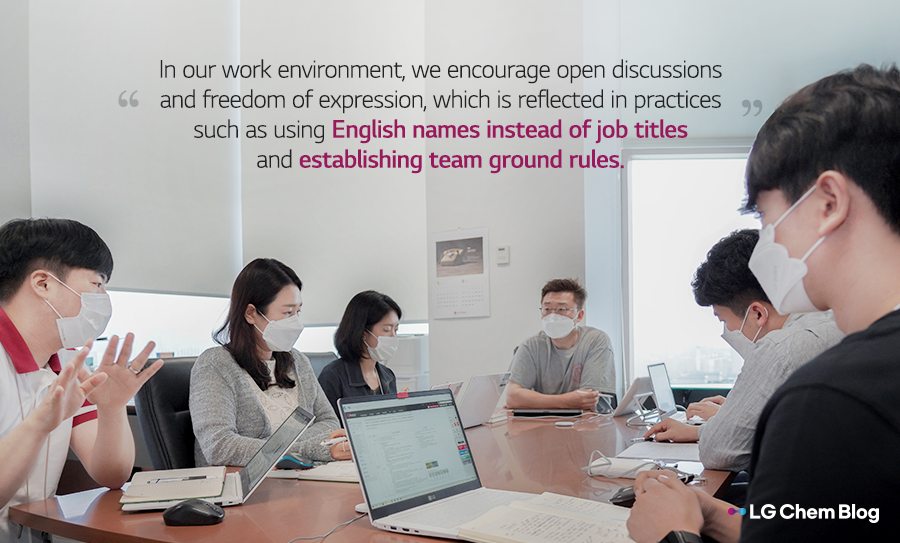
I heard that you work in an environment similar to a startup within LG Chem. What aspects make it comparable to a startup?
•Byung-Jun Park, Specialist: Phoenix TDR aims to establish partnerships where we not only introduce current mechanical/chemical recycling materials but also collaborate with customers on future technologies to meet their evolving needs. We strive to expand PCR products to all customers, moving away from the traditional petroleum-based plastics industry. By embracing this approach, we are venturing into new business areas, making us comparable to a startup.
•Min-Ji Kim, Professional: As a team exploring new business domains, we actively foster a unique system within LG Chem by closely collaborating with experts from diverse fields. This allows us to approach tasks differently, break away from conventional methods, and initiate new projects, enabling rapid progress. Despite being in a new field, our team’s passion to achieve goals outweighs the fear of failure, which truly embodies the spirit of a startup.
•Ki-Jae Lee, Professional: Since our work involves PCR material development, it is crucial to have a space where free opinions and thoughts can be expressed. In this regard, our team cultivates a work environment reminiscent of a startup. We follow practices such as using English names instead of job titles and have team ground rules that promote flexible scheduling of meetings anytime and anywhere. This horizontal and open work atmosphere aligns well with the dynamic culture of startups.
What is PCR PC handled by Phoenix TDR?
•Min-Soo Kim, Specialist: PCR PC is a polycarbonate made from recycled plastic that has been discarded after use. It is an engineering plastic, which is a high-performance plastic material that can replace metals. It exhibits excellent impact resistance, heat resistance, and transparency, making it widely used in industrial applications. We receive PCR PC raw materials from specialized suppliers and apply them in compounds. Leveraging our extensive portfolio and compound expertise, we develop PCR PC by applying LG Chem’s unique compound know-how to the supplied raw materials.
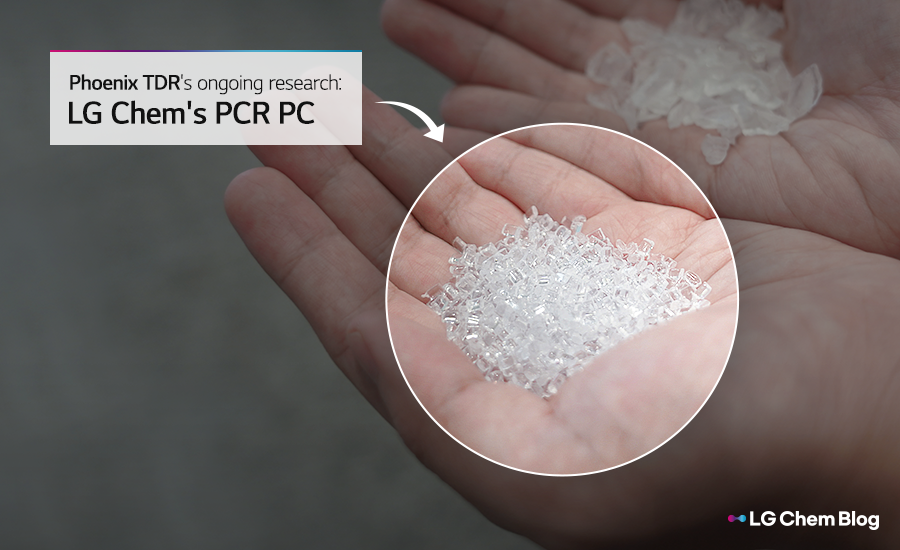
Are there any special competitive advantages or technological strengths that differentiate LG Chem from other products in the market?
•Min-Soo Kim, Specialist: Customers require PCR content that matches the properties of their existing products. We have responded to this demand by incorporating PCR into a diverse range of products, building a robust portfolio of PCR offerings. Currently, our PCR products demonstrate performance levels on par with virgin materials, providing us with a significant advantage in the future recycled plastics market.
•Ki-Jae Lee, Professional: Although the technology for chemically recycling polycarbonate (PC) is widely known, there are no commercial cases yet, possibly due to economic considerations. We have developed a chemical recycling technology that not only regenerates PC from discarded PC but also purifies and recovers DEC (Diethyl carbonate), a byproduct of the decomposition process. This enables us to explore value-added applications like battery electrolytes, where we convert, refine, and recover DEC into compounds such as EMC (Ethyl methyl carbonate). This technological advantage positions us as a driving force towards commercialization and contributes to eco-friendly battery electrolyte products.
•Byung-Jun Park, Specialist: LG Chem stands out from other companies with its ability to achieve properties equivalent to virgin materials. While most companies incorporate PCR content up to 30~35%, LG Chem can incorporate PCR at levels of 50% or even up to 90% while maintaining minimal variations in properties and appearance. We can supply such high-quality PCR globally with a single formulation. Unlike our competitors, who often have varying qualities and recipes across their global sites, LG Chem has established integrated global quality standards, sourcing, and recipes. This allows us to consistently produce high-quality products in any of our facilities.
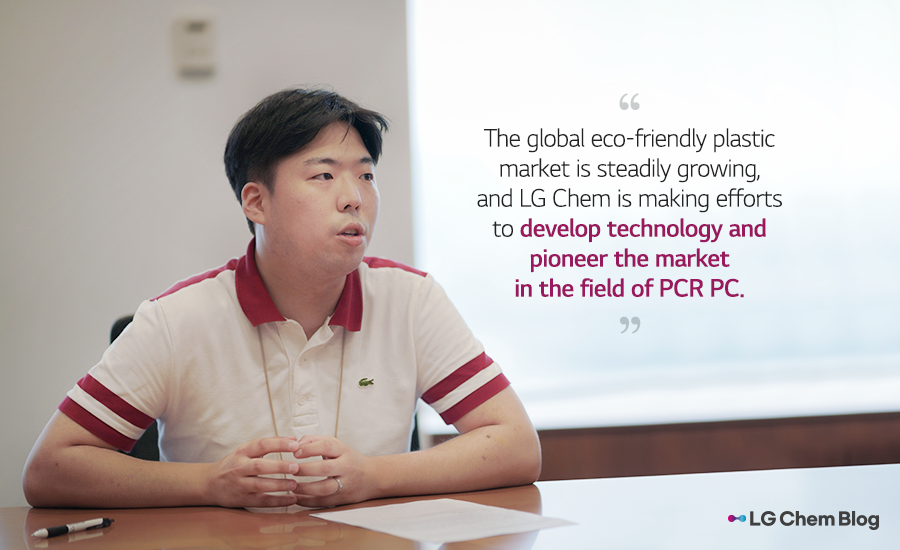
What is the market positioning of LG Chem’s PCR PC?
•Young-Kyung Kwon, Specialist: The global recognition of the severity of global warming and the ocean plastic issue has led to an increased demand for PCR PC. This eco-friendly material can contribute to reducing greenhouse gas emissions and recycling waste plastics. As a result, international initiatives and global companies are actively promoting or mandating the use of PCR PC. According to market research firm MarketsandMarkets, the global market for eco-friendly plastics is projected to grow from 11.85 trillion KRW in 2020 to 31.5 trillion KRW in 2025.
While the demand for eco-friendly plastics is on the rise, there are not many companies that possess the technology and expertise to achieve PCR PC with the same quality level as virgin PC. Our PCR PC demonstrates properties and color implementation comparable to virgin PC, positioning us as leaders in developing technology and pioneering the PCR PC market.
•Byung-Jun Park, Specialist: Currently, global IT customers have a strong demand for PCR products with PCR content exceeding 60%. However, as the PCR content increases, there is a risk to the product’s quality. We are continuously developing high-quality products with high PCR content to effectively meet customer demands. Additionally, we are making consistent efforts to significantly reduce carbon emissions per product. In response to the growing shift towards sustainability in the automotive industry, we are proactively engaging with customers, maintaining consistent communication, and striving to incorporate and apply materials that meet their requirements.
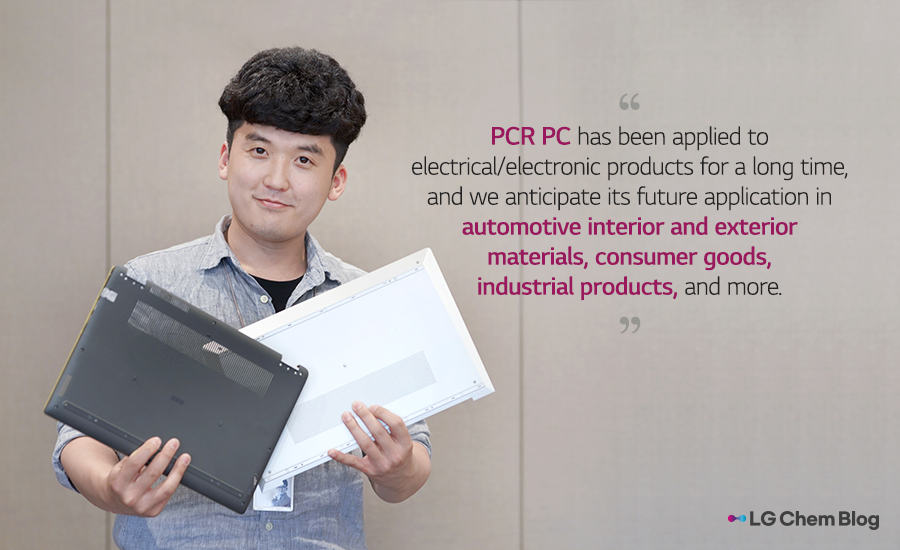
What products is PCR PC currently being applied to, and where can it be applied in the future? What are the prospects and demand for PCR PC and recycled plastics in the market?
•Min-Ji Kim, Professional: Recycled plastics can be applied to a wide range of products that traditionally use PC or PC/ABS. Particularly in the field of electrical/electronic products, there has been a long-standing need for eco-friendly materials, which LG Chem has been able to meet. In addition to conventional IT products such as laptops, tablets, monitors, and printers, recycled plastics are now being applied to AI speakers, expanding their applications. Looking ahead, we expect recycled plastics to be widely adopted in automotive interior and exterior materials, consumer goods, industrial products, and various other areas.
How does mechanical recycling differ from chemical recycling?
•Ki-Jae Lee, Professional: Mechanical recycling (MR) is a process in which post-consumer plastics are crushed, undergo basic cleaning, and are then melted to produce recycled pellets. The plastics used in mechanical recycling contain not only the main polymer but also various additives. However, during the high-temperature *melting process in mechanical recycling, both the polymer and additives undergo deformation, leading to a gradual weakening of the plastic’s inherent properties after multiple recycling cycles. To address these limitations, recent advancements have focused on extracting specific polymers or breaking down the polymer structure into smaller units called monomers. This allows for the recovery of pure monomeric substances that can be re-polymerized and used in various industries. This set of processes is known as chemical recycling (CR).
*melting: refers to the process in which a solid substance absorbs energy and undergoes a state change into a liquid.
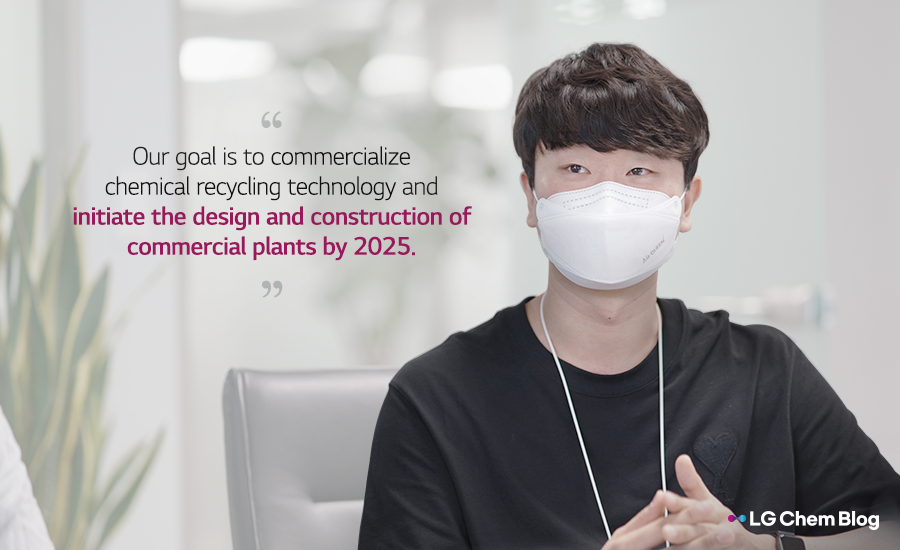
What is the most important aspect when developing materials for mechanical recycling?
•Min-Soo Kim, Specialist: Even if the quality of the raw materials is good, there may be slight differences in mechanically recycled PCR materials compared to virgin materials. Our team is dedicated to finding solutions to address this issue. Additionally, we focus on collecting various data, such as conducting long-term heat resistance evaluations, to build trust with our customers.
Then, what specifically is the process of chemical recycling?
•Ki-Jae Lee, Professional: In the C-PCR development team, we are working on two approaches to chemical recycling. One is the “non-destructive purification” technology, which cleanly recovers only the PC polymer from waste PC compounds. The other is the “decomposition purification” technology, which chemically decomposes the raw materials to recover the monomer BPA (Bisphenol A) that makes up PC.
To put it simply, non-destructive purification is like washing a T-shirt printed with paint in a special way to turn it back into a white T-shirt. The resulting PC is purer, with additives and impurities removed, and it exhibits excellent properties, making it easy to reprocess.
Decomposition purification, on the other hand, can be compared to turning discarded T-shirts back into white threads. With these white threads, we can create different types of T-shirts as desired. Of course, the process is more complex and requires relatively more energy compared to non-destructive purification, but with the obtained threads, we can make white T-shirts of various sizes or create other products such as shoes or blankets.
How advanced is the development of chemical recycling technology?
•Ki-Jae Lee, Professional: Currently, the decomposition purification technology has undergone initial experiments and has been optimized to the point where we can recover BPA (Bisphenol A) at a level comparable to petroleum-based chemicals. Our goal is to collaborate with the process team within our department to initiate the design of a commercialization process (Plant) by 2024. Additionally, in the C-PCR development team, we are also working on the development of chemical recycling technology for PET (Polyethylene terephthalate). At Phoenix TDR, we are simultaneously considering the introduction of external technologies and the development of in-house technologies for the chemical recycling of PET. This technology aims to achieve upcycling by converting waste PET into our PBT/TPEE copolymer products.
Since recycled materials are used, there must be considerations in supply chain management as well.
•Min-Ji Kim, Professional: PCR PC is made from collected and discarded products. Although it uses recycled materials, we have our own strict quality standards and manage recycled materials in four grades. The highest grade of recycled PC can achieve any color and has properties similar to virgin PC. To produce high-quality PCR PC, securing high-quality and clean waste PC feedstock is crucial. When visiting recycled feedstock suppliers for the first time, we sometimes face difficulties in convincing them due to our stringent quality control standards appearing too demanding.
What has been the response from customers regarding recycled materials?
•Byung-Jun Park, Specialist: Automotive customers have been more cautious in adopting recycled materials compared to IT companies, primarily due to their limited experience with such materials. Since recycled materials are still in the early stages and unfamiliar to them, automotive customers have shown a somewhat reserved approach. However, they are continuously expressing interest and evaluating the feasibility of adoption. Consequently, I anticipate an increase in demand for recycled materials in the future.
On the other hand, while Korea is known for its high recycling rates, the reuse rate of recycled materials is not as high. As a result, the recycled plastic market is not as active as in advanced countries, and expanding business in this new area poses challenges. To stimulate the market and meet the growing demand, it is necessary to devise strategies at both the national and corporate levels to increase the reuse rate of plastic and establish supportive regulations. Additionally, raising awareness and perception of recycled plastic is crucial. If the country and businesses actively promote the utilization of recycled plastic, it will become a trend and effectively convey the commitment to sustainability to end consumers.
What environmental impact does PCR PC have throughout its life cycle?
•Young-Kyung Kwon, Specialist: Life Cycle Assessment (LCA) evaluates the environmental impact of industrial activities, including products and services. From an environmental perspective, PCR PC offers a significant advantage in reducing greenhouse gas emissions. By substituting post-consumer plastic for petroleum, which has high emissions, we can produce PC while reducing the use of petroleum resources and contributing to greenhouse gas reduction. Incorporating 50% recycled pellets in PCR PC production can result in over 40% carbon emissions reduction compared to 100% virgin PC.
Furthermore, there are also benefits in terms of water and energy usage. Throughout the product’s entire process, we can save water and energy that would otherwise be required for petroleum extraction and refining. These energy savings, in turn, contribute to greenhouse gas reduction.
Sustainability should be considered not only from an environmental standpoint but also from a social value perspective. We have recently collaborated with Pre-Sustainability, the developer of SimaPro* software, to conduct a social value assessment of LG Chem products.
*SimaPro: A tool used to calculate sustainability and environmental impact.
If you have any personal goals or aspirations in Phoenix TDR, what are they?
•Min-Ji Kim, Professional: In a global era where reducing plastic consumption is crucial, I hope for the availability of more easily recyclable and sorted plastics. It is within my responsibilities to explore new suppliers and ensure high-quality standards to establish a stable PCR business.
•Min-Soo Kim, Specialist: In the automotive interior and exterior materials industry, we are relatively behind in implementing recycled plastics compared to the electronics industry. Therefore, we aim to proactively prepare materials and secure a product lineup that can be offered to customers ahead of time. To achieve this, I will conduct extensive experiments, gather sufficient data, and strive to become a market leader.
•Young-Kyung Kwon, Specialist: I am interested in exploring the development of a Closed Loop Recycled Contents* business to enhance recycling efficiency and improve the quality of PCR products. Additionally, I aim to establish a system that considers both the environmental and social aspects in order to develop sustainable products.
*Close Loop Recycled Contents: A closed-loop structure where a material is used as a raw material, goes through the consumer cycle, and is then recycled back into raw material form.
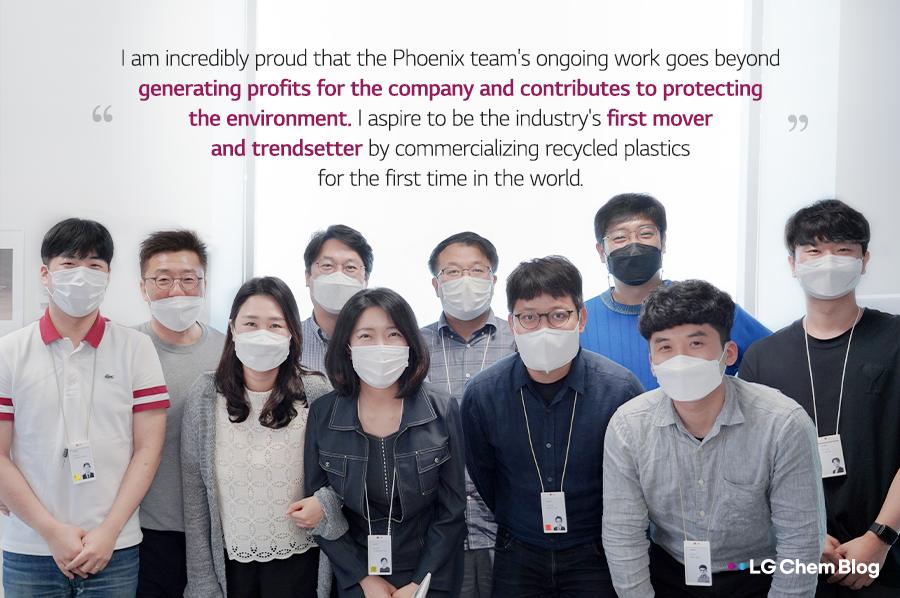
Finally, if there’s anything else you would like to say?
•Ki-Jae Lee, Professional: As a member of the C-PCR development team, my ultimate goal is to establish a factory and become a pioneer and trendsetter in the commercialization of recycled plastics. As researchers, there is no greater satisfaction than witnessing the technologies we develop in the lab being implemented and commercialized in LG Chem, benefiting both the company and the environment. I hope that Phoenix TDR remains committed to our original intentions, working together collaboratively and seamlessly until the day we become the world’s first. We can do it!
•Young-Kyung Kwon, Specialist: Considering that the petrochemical industry has a significant environmental impact, I believe that pursuing sustainable initiatives in this field plays a crucial role in addressing environmental issues. The work undertaken by Phoenix TDR holds value beyond mere economic profit, and I take pride in being a team member contributing to the PCR PC business.
•Min-Soo Kim, Specialist: With the issue of plastic waste spreading in all directions, eco-friendly plastics have become indispensable. LG Chem is recognized as one of the industry’s pioneers in declaring carbon neutrality, demonstrating our early awareness of this problem. Personally, I have immense pride in the ongoing mechanical recycling development work we are engaged in. It goes beyond generating profits for the company and contributes, even if only in a small way, to preserving the environment.
Plastic is no longer just a single-use material; it has transformed into a recyclable resource. We are dedicated to the collection and utilization of post-consumer plastics through recycling. We apply these recycled materials to a wide range of products while continuously researching and developing the necessary technologies. Our aim is to make significant strides in carbon reduction. We kindly request your support for Phoenix TDR as we work at the forefront of developing eco-friendly plastics and expanding our business.

There are no comments yet! Be the first to let us know your thoughts!